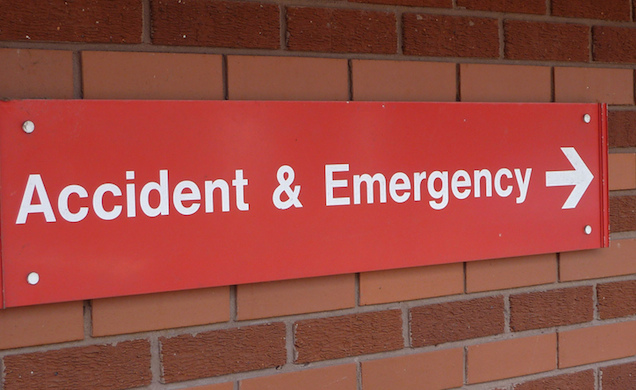Should I go to A&E?

Would you call out roadside recovery if you ran out of petrol? Of course not. It would take ages and wouldn't solve the problem anyway. Yet every day hundreds of men make the same bad call when it comes to their own health by turning up at hospitals' Accident and Emergency or Casualty departments for totally the wrong reason. Don't.
If you know how the NHS works, you'll get what you need more easily and more quickly.
When should I go to A&E?
Go to the nearest A&E department only if you think you need urgent medical attention.
For example:
- If you think you might be having a heart attack — the symptoms to look out for include: crushing chest pain which may also move to your jaw or left arm, makes you feel sick, lasts for more than 15 minutes and isn't relieved by indigestion remedies. (Full heart attack symptoms from the NHS.)
- If you think you may be having a stroke. (Full stroke symptoms from the NHS.)
- Shortness of breath
- Sweating heavily
- If you have a deep wound, such as a stab wound
- If you are losing blood heavily
- If you are having problems breathing or if your lips are tinged blue
- If you may have broken a bone
- If you have a headache and/or flu-like symptoms combined with a rash that doesn't fade when you press a glass tumbler or finger against the rash (this is a symptom of meningitis)
- If you have an erection that won't go down after four hours (a condition known as priapism)
- If you have acute pain in your testicles (you may have a condition known as torsion)
Major A&E departments offer access 24 hours a day, 365 days a year but not all hospitals have an A&E department. You can find an A&E department on this site.
At A&E a doctor or triage nurse will assess your condition and decide on further action. If your life is not in danger you could wait some time.
TV programmes like ER can give the impression that A&E doctors are the best in their profession. Not true. They are experts in accidents but when it comes to say, detecting a lump that could be cancerous, your GP is a much better bet. Look at it this way: your local panel beater may have made your dented front wing as good as new but you still wouldn't ask them to tune your engine.
If it is not an immediate emergency call NHS 111 which is open 24/7 to provide medical advice. Or go and see your GP.
The GP out-of-hours service is available 6.30pm to 8am. When your local GP surgery is shut, an answerphone message will give you the contact details for the out-of-hours service.
When should I call an ambulance?
If an ambulance is needed, call 999 (or 112 which works as the ambulance number throughout the European Union including the UK).
Some people think that by ringing for an ambulance they will be seen as a priority at A&E. Wrong. All new arrivals are assessed by a triage nurse who ensures that patients are seen in order of seriousness. Calling an ambulance when you don't need one will only annoy the very people you want to help you, the doctors and nurses, and may deny an ambulance to someone in a genuine life or death emergency.
Minor injuries units (MIUs) offer assessment and treatment for minor injuries such as sprains and strains.
At NHS walk-in centres you can see an experienced nurse or doctor (although not all centres have a doctor) without an appointment. They offer advice, assessment and treatment for minor ailments and injuries such as cuts, bruises, minor infections, strains and skin complaints.
What about emergency contraception?
Emergency contraception to prevent pregnancy after unprotected sex must be taken within 72 hours. It is free from your GP and most family planning clinics. It is also available from some pharmacies.
|
The Men’s Health Forum need your support It’s tough for men to ask for help but if you don’t ask when you need it, things generally only get worse. So we’re asking. In the UK, one man in five dies before the age of 65. If we had health policies and services that better reflected the needs of the whole population, it might not be like that. But it is. Policies and services and indeed men have been like this for a long time and they don’t change overnight just because we want them to. It’s true that the UK’s men don’t have it bad compared to some other groups. We’re not asking you to ‘feel sorry’ for men or put them first. We’re talking here about something more complicated, something that falls outside the traditional charity fund-raising model of ‘doing something for those less fortunate than ourselves’. That model raises money but it seldom changes much. We’re talking about changing the way we look at the world. There is nothing inevitable about premature male death. Services accessible to all, a population better informed. These would benefit everyone - rich and poor, young and old, male and female - and that’s what we’re campaigning for. We’re not asking you to look at images of pity, we’re just asking you to look around at the society you live in, at the men you know and at the families with sons, fathers and grandads missing. Here’s our fund-raising page - please chip in if you can. |


